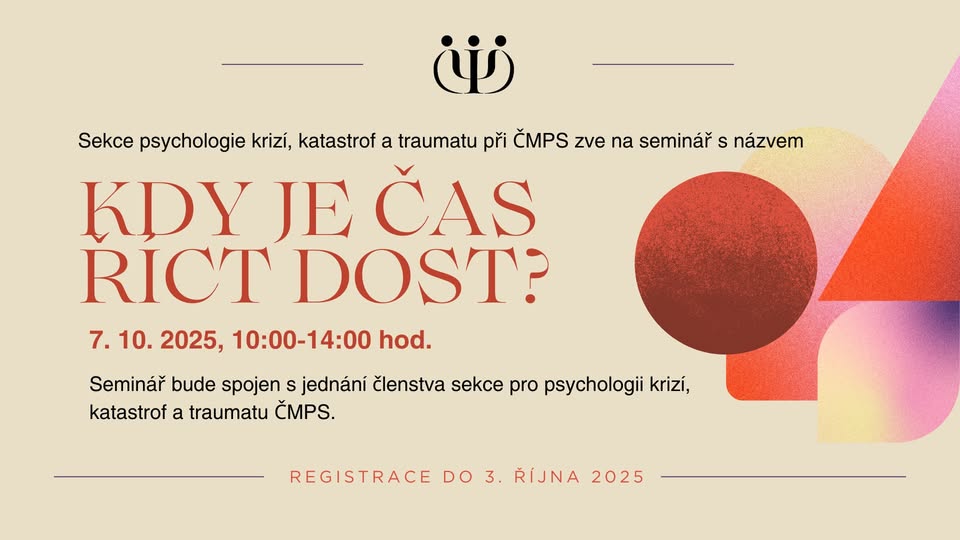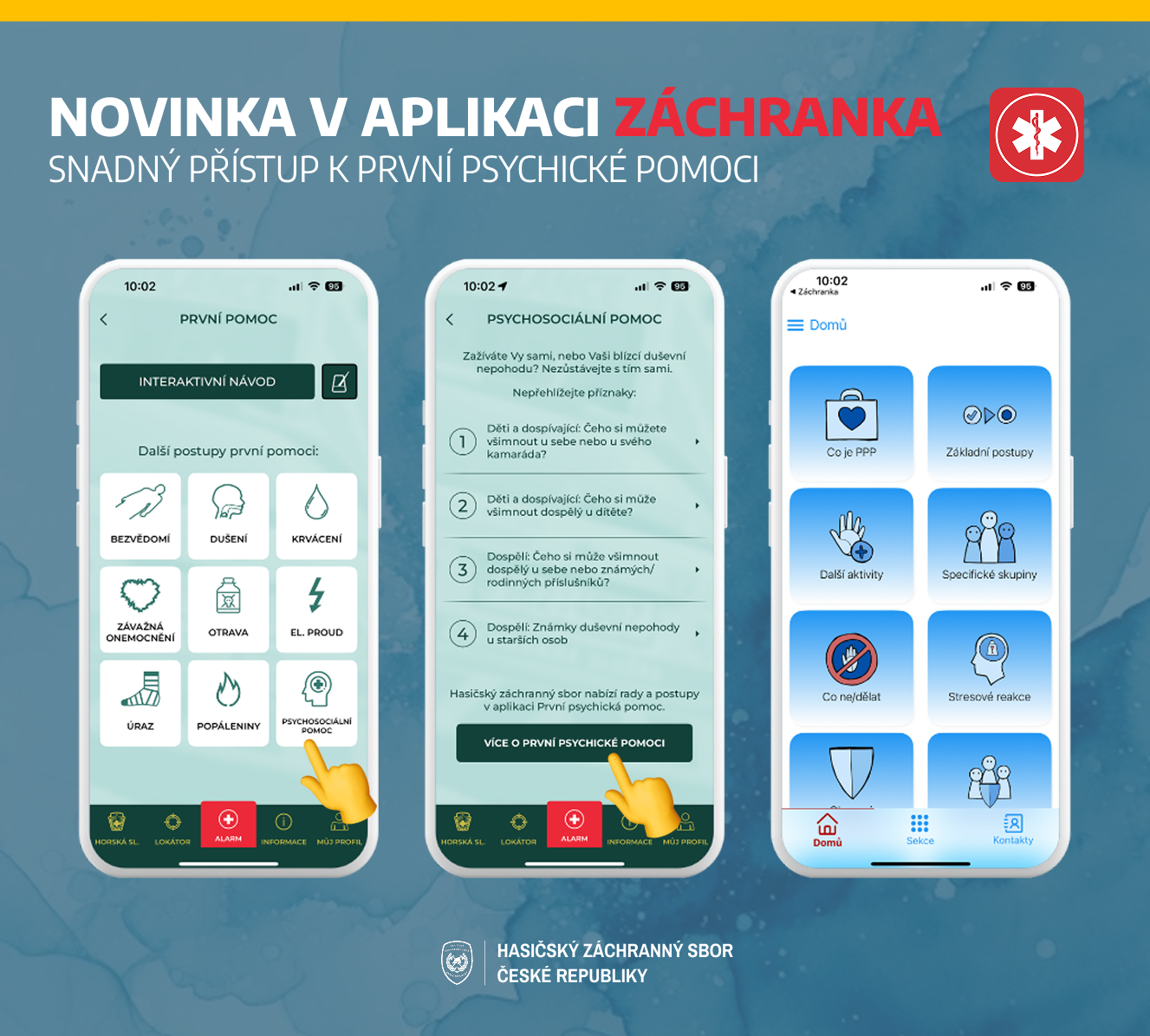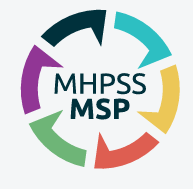Seminář sekce: Kdy je čas říct dost?
7. 10. 2025 proběhl seminář sekce s názvem “Kdy je čas říct dost?” v prostorách Skautského institutu na Praze 1. Cílem semináře bylo sdílet osobní a profesní zkušenost z pozice krizového psychologa a interventa. Diskutovala se dobrá praxe a péče o sebe během poskytování intervencí při mimořádných událostech
Jako hosté se představili: PhDr. Simona Hoskovcová, Ph.D., mjr. Mgr. David Dohnal, Mgr. Karolína Faberová, PhDr. Daniela Vodáčková
Zpráva z proběhlého semináře bude v následujících dnech dostupná ve Zpravodaji ČMSP a fotografie v galerii ČMPS zde: https://eu.zonerama.com/FotogalerieCMPS/589128
Modul psychosociální podpory v aplikaci Záchranka
Apikace záchranka nově přidala do svého obsahu odkaz na psychosociální pomoc. Skrz tento odkaz tak přímo odkazuje i na aplikaci První psychická pomoc. Pro region Prahy navíc aplikace nabízí přehled dostupných odborných služeb. Více informací o aplikaci zde: https://www.zachrankaapp.cz/
72 hodin – Jak se připravit na krizové situace a spoleně je zvládnout
7. 8. 2025 bylo na tiskové konferenci ministerstva vnitra a generálního ředitele HZS oznámenu zpuštení projektu „72 hodin – Jak se připravit na krizové situace a společně je zvládnout“ na adrese www.72h.gov.cz. Cílem projektu je poskytnout občanům státem garantované praktické, ověřené rady přizpůsobené českému prostředí a současným podmínkám, které jim pomohou lépe se připravit na krizové situace, se kterými se v naší republice pravidelně setkáváme. Záměrem není nikoho strašit. Chceme posilovat a rozvíjet sdílenou bezpečnost, kde osobní připravenost podporuje a posiluje systém státní pomoci.
Český překlad dokumentu Minimální balíček služeb pro Duševní zdraví a psychosociální podporu
Vznikl překlad dokumentu WHO koncentrující informace pro oblast duševního zdraví a psychosociální podpory v organizacích a institucích (MHPSS). Tento dokument obsahuje doporučení a rozcestník na další podpůrné materiály a zdroje, podle kterých lze nastavovat a podporovat systém podpory duševního zdraví v jednotlivých organizacích i napříč jimi.
Vodítka jsou užitečná jak pro vedení organizací, klíčové pracovníky v oblasti duševní podpory tak pro veřejnost se zájmem o tuto tématiku.
Česká verze dokumentu je ke stažení na https://www.mhpssmsp.org/en/downloads nebo přímo na odkazu https://www.mhpssmsp.org/sites/default/files/2025-02/MHPSS_MSP_Czech.pdf
Aktualizace aplikace První psychická pomoc
V roce 2024 proběhla aktualizace aplikace První psychická pomoc. Aktualizace se zaměřila na rozvedení některých klíčových témat tak, aby byli srozumitelné laické veřejnmosti. Upravený byl také vzhled aplikace a najdete zde nyní mnoho interaktivních prokliků na užitečné zdroje, videa či kontakty.
Aplikace je pomůckou, která ukazuje možnosti pomoci lidem v těžkých životních situacích. Jejím obsahem jsou praktická vodítka pro poskytování první psychické pomoci. Kromě rad a postupů zde naleznete i seznam vhodných odkazů a kontaktů. První psychickou pomoc můžeme přirovnat k první zdravotní pomoci – je poskytována téměř okamžitě a zvládnou ji i laici. Může v budoucnu zamezit nepříjemným dopadům události.
Aplikace je dostupná zdarma na následujících odkazech
Google Play: https://play.google.com/store/apps/details?id=cz.nic.ppp&hl=cs
Appstore: https://apps.apple.com/cz/app/prvn%C3%AD-psychick%C3%A1-pomoc/id1470927419
Co v aplikaci najdete?
![]() Praktické návody pro poskytování první psychické pomoci
Praktické návody pro poskytování první psychické pomoci
![]() Užitečné rady a postupy
Užitečné rady a postupy
První psychická pomoc je jako ta zdravotní – rychlá, účinná a zvládne ji každý! Stáhněte si naši bezplatnou aplikaci a mějte první psychickou pomoc vždy po ruce!
ADRESÁŘ POMOCI (telefonní linky, on-line)
www.mvcr.cz/clanek/telefonni-psychologicke-linky-pro-seniory-deti-a-dospele.aspx
Hasičský záchranný sbor ČR
- Psychologická podpora na serveru Youtube „Psycholog Hasiči„: www.youtube.com/channel/UC6X6bltq0p8UrXVJFbrp70g
Policie ČR
- Psychologická podpora na serveru YouTube www.youtube.com/playlist?list=PL7q4z0ZRpaLDHzq2j2sSncxC4hhRJ5rqp
- Linka pomoci v krizi www.youtu.be/-Hhys26w-ig
Mezinárodní spolupráce psychologů: Stálý výbor pro psychologii krizí, katastrof a traumatu EFPA
- www.disaster.efpa.eu (v angličtině)
Evropská federace psychologických asociací
- www.efpa.eu (v angličtině)





